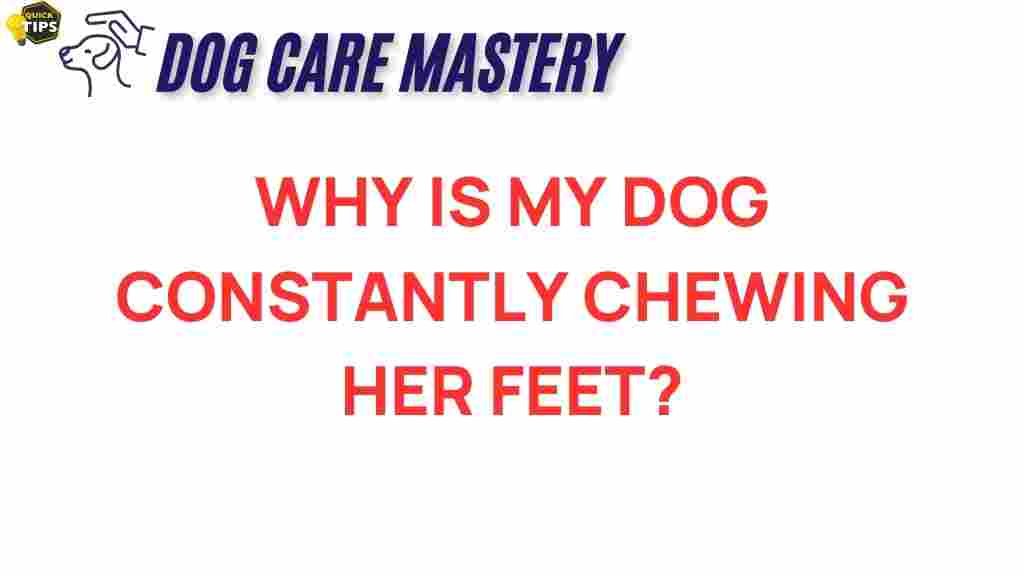Dog Behavior: Unraveling the Mystery of Why Is My Dog Chewing Her Feet?
As dog owners, we often find ourselves perplexed by our furry companions’ actions. One common behavior that raises eyebrows is when a dog chews on her feet. This peculiar habit can stem from various underlying issues, and understanding the reasons behind it is essential for ensuring your pet’s health and happiness. In this article, we will delve into the possible causes of this behavior, provide troubleshooting tips, and offer solutions to help you address the issue effectively.
Understanding Dog Behavior: The Basics
Before we explore the specific reasons why your dog might be chewing her feet, it’s crucial to grasp some fundamental concepts of dog behavior:
- Natural Instincts: Dogs have a natural instinct to groom themselves. Chewing can be a part of this grooming process.
- Communication: Dogs communicate their feelings through behavior. Chewing might indicate discomfort or anxiety.
- Exploration: Dogs use their mouths to explore the world around them, which can include their own bodies.
Possible Reasons for Chewing Behavior
When your dog is chewing her feet, it can be indicative of several issues. Here are some of the most common reasons:
1. Allergies
Allergies are one of the primary reasons dogs chew their feet. These can be environmental allergies, food allergies, or flea allergies. Symptoms may include:
- Red or inflamed skin
- Excessive licking or scratching
- Ear infections
2. Boredom or Anxiety
Dogs are social animals, and lack of stimulation can lead to boredom. Chewing can become a coping mechanism for stress or anxiety. Signs of boredom or anxiety include:
- Destructive behavior
- Excessive barking
- Restlessness
3. Fungal or Bacterial Infections
Infections can cause irritation and discomfort, leading your dog to chew her feet. Look for signs such as:
- Unusual odor
- Discharge or pus
- Swelling or redness
4. Dermatitis
Dermatitis is an inflammation of the skin that can result from contact with allergens or irritants. It can manifest in various ways, including:
- Itching and redness
- Flaky or scaly skin
5. Pain or Discomfort
Sometimes, a dog may chew on her feet due to pain, such as an injury or foreign object lodged in her paw. Watch for:
- Limping or favoring one paw
- Excessive licking of a specific area
Step-by-Step Process for Addressing the Behavior
If you notice your dog chewing her feet, here’s a step-by-step process to address the behavior:
Step 1: Observe
Start by observing your dog’s behavior closely. Take note of:
- When the chewing occurs (e.g., after walks, during specific times of day)
- Any other symptoms present (e.g., itching, redness, swelling)
Step 2: Check for Allergies
If you suspect allergies might be the culprit, consider the following:
- Review your dog’s diet. Are there any recent changes?
- Check for fleas and ticks.
- Consult your veterinarian for allergy testing.
Step 3: Provide Stimulation
If boredom is a factor, enhance your dog’s environment by:
- Incorporating interactive toys
- Increasing exercise through walks or playtime
- Engaging in training sessions to stimulate her mind
Step 4: Consult a Veterinarian
If the chewing persists, schedule an appointment with your veterinarian. They can:
- Perform a thorough examination
- Rule out infections or underlying health issues
- Prescribe medications or treatments if necessary
Troubleshooting Tips for Dog Behavior
In addition to the above steps, here are some troubleshooting tips that can help address your dog’s chewing behavior:
1. Keep Her Paws Clean
Regularly clean your dog’s paws to remove dirt, allergens, or irritants that may cause discomfort. Use a damp cloth or pet-safe wipes.
2. Use Protective Gear
Consider using dog booties or protective wraps if your dog is chewing from irritants encountered outside. This can provide a barrier and prevent further irritation.
3. Redirect the Behavior
If you catch your dog in the act of chewing, redirect her attention to a toy or engage her in a game. This can help break the habit over time.
4. Monitor Stress Levels
Assess your dog’s environment for potential stressors. Changes in routine, new pets, or loud noises can contribute to anxiety. Provide a safe space for her to retreat when needed.
5. Seek Professional Help
If the chewing behavior continues despite your efforts, consider consulting a professional dog trainer or behaviorist. They can offer tailored strategies to address behavioral issues.
Conclusion
Understanding why your dog is chewing her feet is crucial for her well-being. By observing her behavior, identifying potential triggers, and implementing effective solutions, you can help her overcome this habit. Remember, if the problem persists or worsens, seeking professional help is always a wise decision. For more information on dog behavior and care, feel free to explore our comprehensive resource section. Your furry friend deserves the best care, and your attention can make a significant difference in her quality of life.
Additionally, for more insights into dog health and behavior, check out this external link for expert advice. Take action today to ensure your dog’s happiness and health!
This article is in the category Behavior and created by dogcaremastery Team
